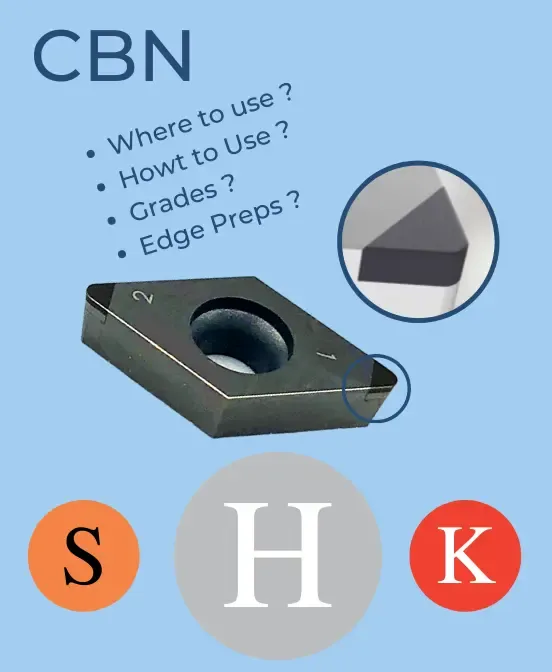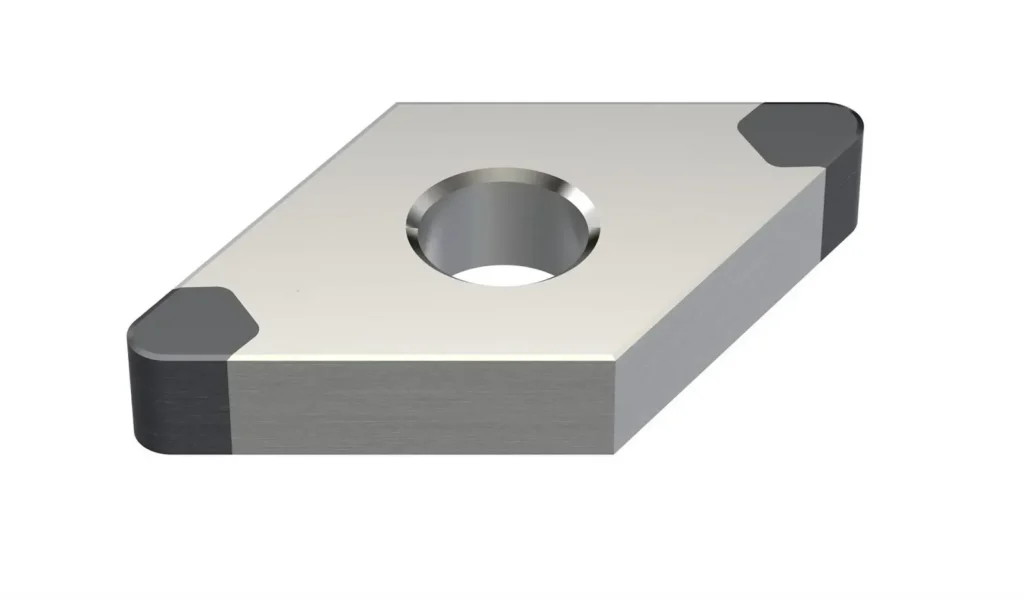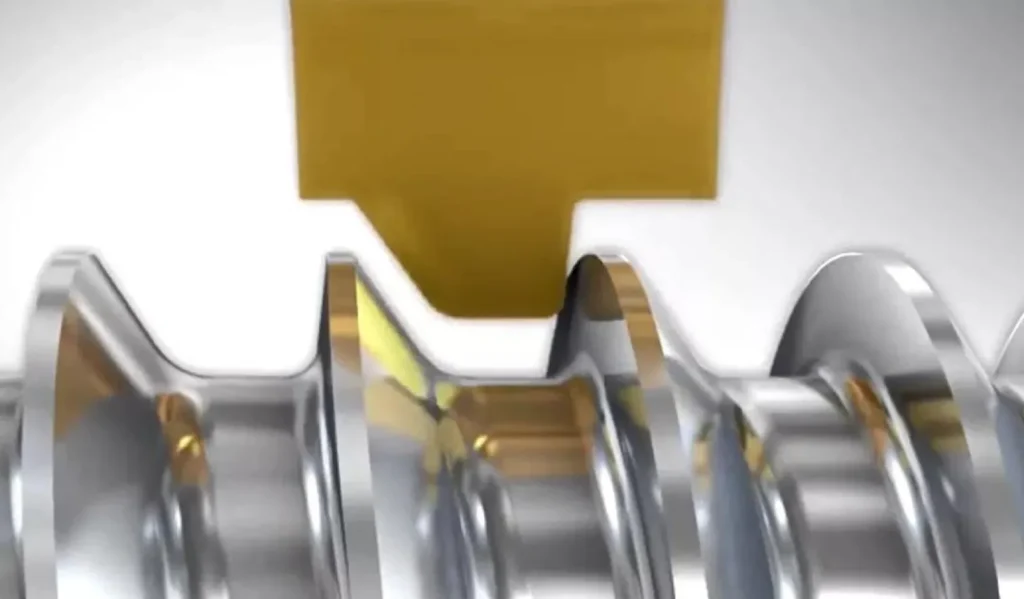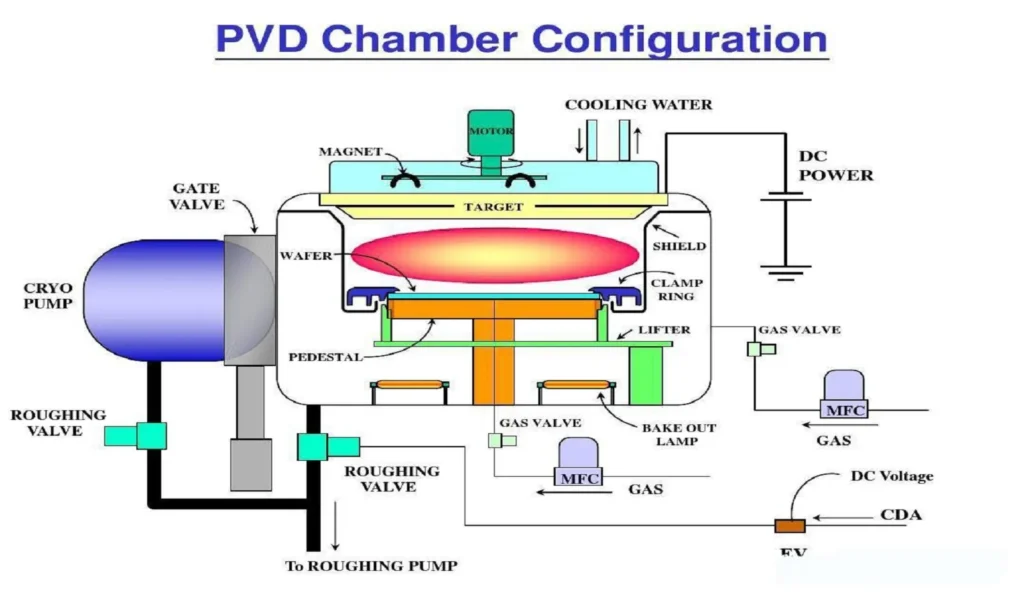CBN 刀片綜合指南:成分、應用與產業用途
(立方氮化硼)CBN刀片是一種超硬切削刀具,用於加工高硬度材料。本指南詳細介紹 CBN 刀具、其特性、應用以及特定產業的使用案例。

CBN 材料簡介
立方氮化硼 (CBN) 是一種非凡的合成材料,為切削工具產業帶來了革命性的改變。CBN 於 1957 年由通用電氣公司的 Robert H. Wentorf Jr. 發現,是將六方氮化硼置於極高的溫度與壓力下而形成。此製程將六方氮化硼柔軟的石墨狀結構轉換成立方晶格,使材料具有極高的硬度與熱穩定性。CBN 的獨特特性來自於立方結構中硼原子與氮原子之間的強共價鍵。儘管 CBN 是僅次於鑽石的第二硬材料,但其化學穩定性和耐熱性卻超越鑽石,使其成為加工鐵質材料和超合金的無價之寶。CBN 的開發大大提升了製造能力,使以前極難或無法有效加工的材料得以有效加工。
CBN (立方氮化硼) 工具是用於加工高硬度材料的超硬切削工具。本指南詳細介紹 CBN 刀具、其特性、應用以及特定產業的使用案例。
CBN 的組成與結構
CBN 是一種人工合成的超硬材料,硬度僅次於鑽石。它由氮原子和硼原子組成,呈立方晶體結構排列,因此具有極高的硬度和熱穩定性。CBN 刀片通常是在高溫高壓下燒結 CBN 顆粒,然後將其與金屬基板接合而成。
CBN 刀片的主要特性

- 高硬度: CBN 的硬度接近鑽石,可有效切割高硬度材料,如硬化鋼、鑄鐵和超合金。
- 耐磨損性: 由於其高硬度及穩定的晶體結構,CBN 刀具展現出優異的耐磨性,因此在加工高硬度材料時,刀具壽命較長。
- 熱穩定性: CBN 刀具在高溫下仍能保持穩定,因此適用於高速切削和乾式加工作業。
- 化學穩定性: CBN 對黑色金屬具有化學惰性,可防止在加工鐵基材料時與工件發生化學反應。
- 熱傳導性: CBN 具有良好的導熱性,有助於切削作業中的散熱,減少對刀具和工件的熱損害。
CBN 刀片的應用
CBN 刀具廣泛應用於需要高硬度與耐磨性的領域:
- 硬化鋼: 在汽車製造和模具生產中,CBN 刀具用於加工熱處理後的高硬度鋼材。
- 鑄鐵: 適用於灰鑄鐵和球墨鑄鐵的精密加工。
- 粉末冶金材料: 用於機械加工 碳化物 和粉末冶金零件。.
- 高溫合金: 在航太工業,CBN 刀具用於加工鎳基和鈷基高溫合金。
- 硬化軸承: CBN 刀具能有效加工淬硬軸承零件,提高效率與精度。
CBN 刀片的種類
CBN 工具有多種類型,取決於其預期用途和製造過程:
- CBN 車削工具: 用於車削高硬度材料的外徑、內孔及端面車削。
- CBN 銑刀: 用於銑削硬質材料的平面和槽。
- CBN 搪孔工具: 用於精密搪孔作業。
- CBN 砂輪: 用於硬化材料的高精度研磨。
- CBN 刀片: 可更換的刀刃,可安裝在各種刀把上,用於車削、銑削和搪削加工。
使用 CBN 刀片的最佳作法
- 最佳化切削參數: 根據工件材料的硬度和特性,選擇適當的切削速度和進給率,以避免過高的切削溫度和刀具磨損。
- 冷卻與潤滑: 雖然 CBN 刀具適用於乾式切削,但在某些高溫加工作業中使用冷卻液可延長刀具壽命。
- 剛性夾緊: 確保刀具與工件的剛性夾持,以減少振動並提昇加工的穩定性與精準度。
- 刀具路徑策略: 實施適當的刀具路徑策略,以維持一致的切削載荷,並將刀具磨損減至最低。
- 定期工具檢查: 定期檢查 CBN 刀具是否有磨損和損壞,以保持最佳的切削性能和工件品質。
CBN 刀片的特定產業應用
1.汽車製造
背景: 汽車工業,尤其是引擎和變速箱零件製造,需要加工高硬度材料,如硬化鋼和鑄鐵。
個案研究:
- 引擎缸體加工:CBN 刀具用於加工引擎缸體的汽缸孔,可提高效率與表面品質。
- 齒輪生產:在傳動齒輪的硬車削加工中,CBN 刀具可大幅延長刀具壽命,減少機器停機時間。
2.航太工業
背景: 航太工業廣泛使用高溫合金和鈦合金,這些材料的加工具有挑戰性,需要高性能的刀具。
個案研究:
- 渦輪葉片加工:CBN 刀具用於加工高溫合金渦輪葉片,可提高切削效率和零件精度。
- 結構零件加工:CBN 刀具在加工鈦合金結構零件方面表現優異,可降低換刀頻率並提昇生產效率。
3.模具製造
背景: 模具製造涉及大量淬硬合金和高硬度鋼的加工,需要耐磨性高、壽命長的工具。
個案研究:
- 注塑模具加工:CBN 刀具用於注塑模具的硬車削和磨削,可顯著提高加工精度和表面光潔度。
- 沖壓模具加工:在精密加工沖壓模具時,使用 CBN 刀具可延長模具壽命並降低維護成本。
4.重工業
背景: 機械加工產業需要加工各種高硬度、難加工的材料,如硬化鋼、粉末冶金材料等。
個案研究:
- 軸承製造:CBN 刀具廣泛用於軸承滾道的硬車削,可提高加工效率和軸承壽命。
- 粉末冶金零件加工:CBN 刀具在加工粉末冶金零件時表現優異,可有效降低刀具磨耗並提高生產效率。
5.能源產業
背景: 能源產業涉及許多高硬度及耐磨材料的加工,例如石油鑽探設備及風力發電設備的零件。
個案研究:
- 石油鑽探設備:CBN 刀具用於加工石油鑽探設備的耐磨零件,可大幅提高加工效率及零件耐用性。
- 風力發電設備:使用 CBN 刀具加工風力發電設備的齒輪和軸承,可提高零件精度和壽命。
6.醫療設備製造
背景: 醫療設備製造需要高精度和表面品質,涉及的材料如鈦合金和不銹鋼,對切削工具有很高的要求。
個案研究:
- 骨科植入物加工:CBN 工具用於加工鈦合金和不銹鋼骨科植入物,可改善表面光潔度和尺寸精度。
- 牙科器械加工:在牙科器械的精密加工中,CBN 工具的使用大大提高了生產效率和產品品質。
CBN 刀片技術的未來趨勢
- 奈米結晶 CBN: 開發具有奈米尺寸晶粒的 CBN 工具,以改善硬度與耐磨性。
- 混合工具: 將 CBN 與陶瓷或鑽石等其他材料結合,創造出具有特定應用最佳特性的工具。
- 快速成型製造: 探索使用快速成型製造技術生產具有複雜幾何形狀和最佳化冷卻通道的 CBN 工具。
- 智慧型工具: 在 CBN 工具中整合感應器,以即時監控工具磨損和切削狀況。
- 綠色製造: 開發最佳化的 CBN 刀具,適用於乾式加工和最小量潤滑 (MQL),以減少對環境的影響。
這些案例研究和未來趨勢顯示了 CBN 刀具在各行各業的廣泛應用和優勢。通過明智地選擇和使用 CBN 刀具,製造商可以顯著提高加工效率、工件質量和刀具壽命,同時降低生產成本。
什麼是 CBN 刀片?
CBN 刀片是由立方氮化硼 (CBN) 製成的切削工具零件。它是一種可更換的小件,可固定在較大的刀把上。CBN 刀片專門用於硬質材料的切削加工,一般硬度為 45 HRC 或更高。
CBN 刀片」是什麼意思?
「CBN 刀片 」是指由立方氮化硼製成的切削刀具刀片。這些刀片用於各種加工作業,特別是硬車削,在切削淬硬鋼、鑄鐵和超合金時表現優異。此名詞包含切削刀具的材質 (CBN) 及形狀因素 (刀片)。
CBN 刀片有哪些應用?
CBN 刀片應用範圍廣泛,主要用於硬加工作業:
軸承鋼、工具鋼和表面硬化鋼的硬車削
鑄鐵零件的精加工作業
粉末冶金材料的機械加工
航空航天應用中的高溫合金切割
汽車製造中淬硬齒輪和軸的精密加工
模具製造中的精加工操作
誰是主要的 CBN 刀片製造商?
多家領先的切削工具公司生產 CBN 刀片。其中一些著名的製造商包括:
山特维克可乐满
肯納合金
三菱材料
住友電機
山高工具
Iscar
京瓷
ONMY Toolins
值得注意的是,市場是動態的,可能會有其他製造商或產業出現變化。使用者應研究目前的選項,並諮詢供應商,找出最適合自己特定需求的產品。
CBN 刀片的典型速度和進給為何?
CBN刀片的速度與進給依特定的應用、工件材料及刀片等級而有所不同。然而,以下是一些一般的準則:
切削速度:用於硬化鋼 (45-65 HRC):100-250 m/min
適用於鑄鐵:300-1500 m/min
適用於高溫合金:150-300 m/min
進給速率:粗加工:0.1-0.3 mm/rev
精加工:0.05-0.15 mm/rev
切削深度:粗加工:0.2-2.0 mm
精加工:0.1-0.5 mm
這些都是一般範圍,實際參數應根據特定刀片等級、工件材料特性、機器能力及所需表面光潔度來調整。請務必參考製造商的建議並進行測試,以針對您的特定應用最佳化參數。
請記住,與傳統硬質合金刀具相比,CBN刀片通常在較高的切削速度下表現最佳。然而,CBN刀片也需要更嚴格的機器設定,而且通常需要使用特殊的冷卻策略。



